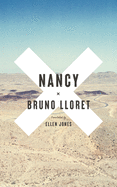
In Chilean author Bruno Lloret's inventively sly debut novel, Nancy, the narrative might seem relatively transparent: titular Nancy approaches death by cancer and recalls her happy childhood, her dangerous adolescence, her brother's disappearance, her mother's abandonment, her father's Mormon conversion, her husband's gruesome death. Lloret, however, is creating something more than story; his opening author's note requests readers to "engage with the text in different ways." That intriguing invitation immediately manifests on a first page filled with Xs arranged rather like the bottom half of an hourglass, as if Nancy's tragedy is already well in progress, and time is literally running out. Indeed, discerning time will require meticulous attention--watch for passing decades and a single tombstone.
Nancy originally formed in Lloret's imagination as a ghost, making her already otherworldly. In daring "to construct a voice, a rhythm outside my own physical boundaries," Lloret eschews standard punctuation for single, multiple, only Xs--inspired by flipping Spanish's angle quotation marks from (< >) to (><)--transforming the pages into a "visual enigma." Emphasizing the fever-dreamish nature of Nancy's memories, the Xs as marks on the page might serve as pauses, elisions, even requests for active engagement. The repeated references to physical crosses--in the desert, in fields, in cemeteries--further serve as warnings and markers of death, not only of Nancy's inevitable demise, but a chilling reminder of Chile's (and too many other nations') high rates of femicide.
Originally published in Chile in 2015 and brilliantly, stunningly translated by Ellen Jones, Nancy proves both bewildering and illuminating. For intrepid readers, indelible rewards await. --Terry Hong, Smithsonian BookDragon

